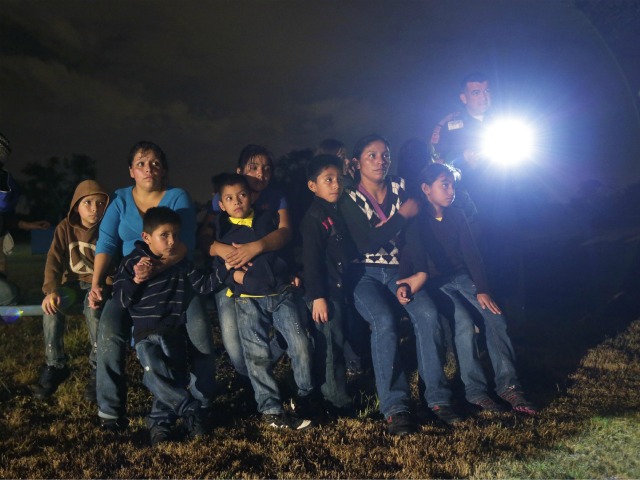
Despite the incessant lectures from the mainstream press, establishment Republican politicians, and consultants about the need to pass amnesty legislation to appeal to Hispanic voters, two recent studies of the Latino electorate suggest that Republicans can oppose amnesty and still win elections in the midterms and beyond.
A Pew Hispanic Research study found that though a record 25.2 million Latinos (11 percent of eligible voters nationwide) are eligible to vote in the 2014 midterm elections, “in many states with close Senate and gubernatorial races this year, Latinos make up a smaller share of eligible voters.” In fact, in the “eight states with close Senate races, just 4.7 percent of eligible voters on average are Latinos.”
And a Washington Post analysis determined that “upcoming elections will see larger numbers of older voters,” and there is a strong “correlation between seeing more older Americans and voting more heavily against Obama.” The study found that “as counties got older, they were slightly less likely to support Obama” and “as they saw increased populations of Hispanics, they were slightly more likely to.” But the Post’s analysis concluded that there is a “very weak correlation between areas with increased Hispanic populations voting more for Obama and a very strong correlation (an r-squared value of .88, for those who care) between an increase in median age and less support for the president.” According to the Post, opposing amnesty legislation “won’t put the GOP at much of a disadvantage.”
“The party probably won’t see a surge in Hispanic voters in 2016, but the number of older white voters could very well offset that imbalance,” the Post concluded.
As the Pew Hispanic report found, only in Colorado do Latinos “exceed the 10.7 percent national average.” According to Census data, “Latinos make up less than five percent of eligible voters in six” of the eight states:
Colorado: 14.2%
Kansas: 6.0%
Alaska: 4.8%
North Carolina: 3.1%
Arkansas: 2.9%
Louisiana: 2.8%
Iowa: 2.7%
Kentucky: 1.6%
As a result, Pew concluded that “the impact of Latino voters in determining which party controls the U.S. Senate may not be as large as might be expected,” especially since Latinos do not vote in the same numbers as whites and blacks and have a large number of young eligible voters who are more disinclined to go to the polls. The study found that not all eligible Latino voters are registered to vote “or turn out to vote in an election,” as “Hispanic voter turnout rates in midterm elections and presidential elections have lagged” behind whites and blacks. In addition, young Hispanics (33% of Hispanic eligible voters are ages 18 to 29, according to Pew.) “are a larger share of eligible voters than they are among other groups,” which means Hispanics have the largest share of voters that are least “likely to turn out or be registered to vote.”
This year, President Barack Obama delayed his executive amnesty because Senate Democrats, aware of how unpopular amnesty is, begged him not to act to help them preserve the Senate.
But outlets like the New York Times, aided by establishment Republican figures, continue to write stories that allege that not supporting massive amnesty legislation “may backfire” on Republicans after the midterms. They never mention that pushing for amnesty legislation may compel working-class Reagan Democrats to stay at home just like social conservatives and libertarian-leaning voters may if candidates are not sufficiently for “faith and freedom.”
“You should never underestimate the ability of the Republicans to screw something up and blow an ideal opportunity,” establishment GOP consultant Ralph Reed told the Times. “There is a sense in which, I think, the overwhelming desire to gain control of the Senate has kind of so fixated the party’s strategic brain trust that trying to get a hearing on long-term strategic issues doesn’t seem to be possible at the moment.”
Reed’s comments echo those of establishment Republican consultant John Feehery, who is also advising House Majority Whip Steve Scalise (R-LA). Feehery said Republicans must pass amnesty legislation “pronto” even if they win back the Senate because of the electorate’s disapproval of Obama’s executive amnesty. House Speaker John Boehner has said he would like to pass amnesty legislation if Republicans gain control of the Senate. So has Sen. John Cornyn (R-TX), who may become the Senate Majority Whip. And establishment Republican politicians like Jeb Bush have also said on the stump this year that Republicans should pass amnesty legislation if they gain control of Congress after the midterms.
Establishment Republicans in the permanent political class assume that immigration will be the determinative factor in how Latinos vote even though polling data has indicated that may not be the case. In fact, a comprehensive Univision survey of the Latino electorate in California found that immigration was not one of the top issues important to Hispanics. A majority of Hispanics wanted border security before any bill that awards a pathway to citizenship for illegal immigrants it put on the table. (Another survey found a strong majority of Hispanics oppose immigration policy that favors “a few billionaire CEOs and immigration activists lobbying for open borders” instead of the nation as a whole.) And only 10 percent of Latinos in the Univision survey said their top gripe with Republicans is their opposition to amnesty legislation, as Breitbart News has reported.

COMMENTS
Please let us know if you're having issues with commenting.